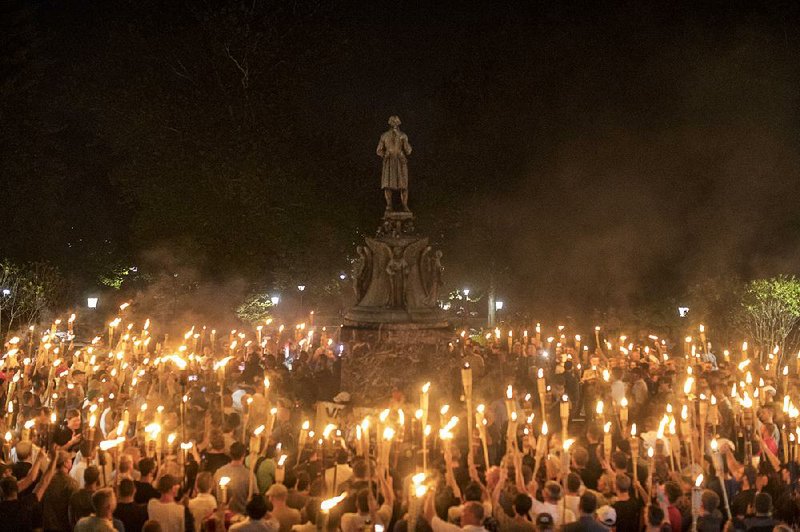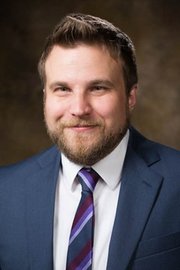Diversity & inclusion are @Uarkansas values. Not this. We value free speech but condemn hatred, violence & white supremacy. #Charlottesville pic.twitter.com/sXT8dmSVxo
— Joseph Steinmetz (@JoeSteinmetz) August 12, 2017
University of Arkansas assistant professor Kyle P. Quinn hasn’t slept in his own bed in three days. Not since a web-sleuth posted his home address online and strangers began clamoring for his resignation — all because he was wrongly identified, and a social media mob quickly condemned him.
As a white pride rally in Charlottesville, Va., spurred a slog of violence Friday night into the weekend, including a death of a 32-year-old woman, social media became the next battlefield. Enraged anti-racists took to Twitter to bash the bigots shown in photographs at the rally, and Quinn got caught in the fray.
Quinn, an assistant professor in the College of Engineering, runs a university lab that works to understand abnormalities in the “wound healing process,” and is not, as hundreds of social-media users assumed, a white supremacist.
[GALLERY: Read 60+ emails sent to professor's email after he was misidentified]
But in the aftermath of the Virginia violence, online accounts began posting cropped photos of the men who attended the Unite the Right rally and asking users to identify them. Among those photos was one showing a brown-haired white man with glasses who touted a torch and wore a red University of Arkansas College of Engineering T-shirt.
A Twitter account called “Yes, You’re Racist,” which boasts more than 350,000 followers, shared the picture and captioned it, “Any Arkansas Engineering folks recognize this guy? Must be awfully proud of his school to represent it at a Klan rally...”
Social media answered, wrongly, with a yell.
Internet sleuths shared side-by-side photos of the torch-wielding man next to Quinn’s headshot from the University’s website, saying this was their guy. The two bear some resemblance, but the man at the rally is someone else.
Users also shared side-by-side photos of the engineering T-shirt man and Billy Roper, a brown-haired, bespectacled white supremacist from Russellville. After first telling hoards of angry people it was him in the photo, Roper wrote on his blog that he had lied to mess with “leftists.” He then commended rally-goers for their “acts of courage and manly self-defense."
Quinn, who was at home in Fayettevillle on the couch with his wife, got a call from Amy Schlesing, UA's director of strategic communications. She told him she was sorry she was about to ruin his weekend, Quinn said in an interview Monday.
The professor learned he’d been misidentified and that social media users were amassing an army through tweets and retweets.
“I thought it was ridiculous and I was shocked, but I didn’t really understand what was about to happen and the kind of emails and phone calls and posting online that I was about to get,” Quinn said.
Dozens of emails, tweets and phone calls poured in from fuming strangers. A petition posted on Change.org called for Quinn’s resignation. It's since been taken down.
“I checked my messages once, and then I knew I didn’t want to check my messages anymore,” Quinn said.
The threats he was getting, while not explicitly violent, were certainly full of vitriol.
“No one said, ‘I’m going to kill you,’ but basically, ‘I hope you choke on your white racism,’” something along those lines,” Quinn said.
Schlesing said in a phone interview Tuesday that once the university verified Quinn did not attend the rally, they started to reinforce the same, clear correction. They flagged the misinformation and reported any threatening message.
Still, news gathers steam on social media within seconds and is almost “impossible to stop,” she said. The university was inundated with emails filled with unprintable curses.
Schlesing, who noted she covered the Iraq and Afghanistan wars while at the Arkansas Democrat-Gazette, called the emails "some of the worst language I've ever seen."
“It’s still going on. It’s not over,” Schlesing said.
Acquaintances Quinn hadn’t seen in two decades reached out to ask what was going on, he said. One man with whom Quinn went to high school was unaware he became a professor. The man couldn’t believe the misidentification took off online, he told Quinn, because the photo didn't look like him.
On Saturday, Quinn and his wife stayed hunkered down at home, he said. They tried to do a little yard work but were mostly on the phone with the University’s communications people and campus police. Then, Quinn said, someone posted their home address online.
They shipped off to a friend’s house for the night and then left for Quinn’s parents’ home outside Arkansas borders the next day. His wife, and others in his life, are horrified and angry about the online hate that’s poured in, he said. Quinn said he’s upset as well, though he tends to be pretty even-keeled.
“You kind of have to be in this job,” he said. “You’re constantly getting rejections from grants or paper revisions. Having misunderstandings is part of the job. I think that probably helps prepare someone a little bit.”
To quell the misplaced outrage, the University issued a statement and got some of the comparison photos taken down, Quinn said. He defended himself on Twitter, saying whoever wore the shirt “obviously does not represent my values” or the college’s values. He then thanked people who supported him through the mixup.
Several Twitter users tweeted back apologies for their rash reactions. “I try to speak/spread only love," one user wrote, "and yet i (sic) jumped on the 1st ship accusing you of something you had no part of."
“i (sic) have so much to learn,” she continued, punctuated with a frowny face.
Read Wednesday's Arkansas Democrat-Gazette for full details.

